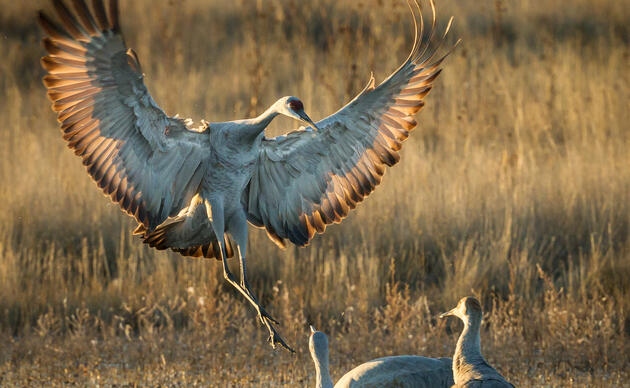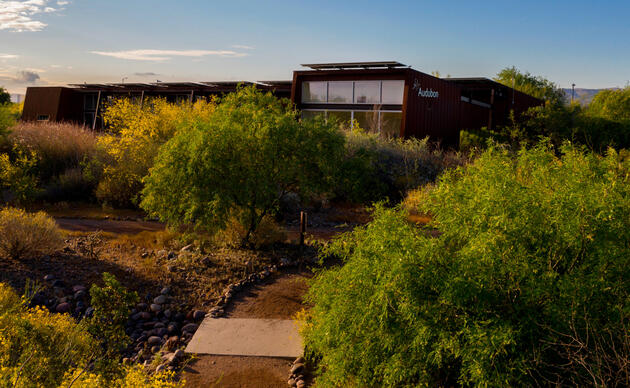Help Birds In Your Community
Windows collide with birds! Collisions are a frequent cause of bird death – especially during migrations. Birds can see trees or the sky reflected in windows or mistake houseplants for outdoor plants – they don’t see glass! You can help by making your windows more visible to birds.
Put a leash on! Unleashed dogs and outdoor cats can harm birds by disturbing, chasing, and even killing them. Keeping your cat indoors and your dog from straying can protect birds. Check out the national campaign led by the American Bird Conservancy called "Cats Indoors!” which Audubon is a partner in: http://birds.audubon.org/faq/cats-and-birds. For more info, you can download reports about the impacts of cats on birds and other wildlife, listed at the bottom of this page.
Leave Fledglings Where You Find Them! Young chicks that have just left the nest (fledglings) may spend several days on the ground before they are able to fly. You can help by keeping people and pets away. Typically, parents continue to care for them. If you think a bird is truly an orphan, call a wildlife rehabilitator for instructions. For information about finding a wildlife rehabilitator please visit - http://www.nwrawildlife.org/content/finding-rehabilitator
Clean Your Bird Feeders! Dirty feeders can spread disease. Disinfect and clean out old seed from feeders frequently and put fresh water in your bird bath every few days.
Don’t Buy Illegally-Caged Birds! Selling wild-caught birds as pets is illegal. Buy only captive-bred birds. Make certain that the breeder or pet store is reputable.
Use Cloth Grocery Bags and Reusable Bottles! Birds that mistakenly eat plastic trash can become ill or even die. Avoiding plastic bags and bottles reduces plastic pollution and conserves resources.
Recycle! Anything you recycle reduces litter and saves resources. Get creative! You can make a bag from used juice containers and bird feeders from old dishes and plastic bottles.
Restore Natural Habitat in Your Community! Birds need a place to live and many bird habitats are disappearing. City parks and open spaces are natural places for birds. Work with your community to recreate the habitat that once existed in your area.
Plant Native! Native plants provide food, nest sites, and cover for birds. Birds can use native plants as a food source, a place to raise their young and as a place to escape predators.
Keep Your Distance! Birds need space for feeding, nesting, and other daily activities. Approaching too closely may cause them to become nervous and deplete much-needed energy reserves. During the nesting season, it may even result in loss of eggs or young to predators.
Slow Down When Driving! Cars can kill millions of birds each year. Driving slower gives you more time to respond if there is an animal in the road and gives the animal plenty of time to get out of the way.
Buy Bird Friendly Products! You can help preserve bird habitat in Mexico, Central and South America and the Caribbean by buying shade-grown coffee and chocolate. Coffee grown in shade farms imitate native forests and have many more bird species than sun coffee farms.
Teach Others About Birds! Talk to your friends about birds and start a club in your community to teach people about the challenges birds face. The more people know, the more they can do to help.
Get Outdoors and Enjoy Nature! You can appreciate the bird habitat near your home. Find a local park and go for a walk or just stroll around your neighborhood.
Take a Friend Bird Watching! Invite a buddy and see if together you can spot more birds.
Support Conservation! Join a bird club or other conservation organization to learn more and contribute to protecting birds. Volunteer with organizations that preserve habitat and help birds.
Be a Community Scientist! Many projects need helpers to gather data on birds and their habitat. Contact your local Nature Center, library or conservation organization to volunteer.
Reduce Energy Use! Riding your bike or walking reduces your carbon footprint and prevents pollution of bird habitats. Switching the lights off in your house not only shrinks your energy bill, but can also help prevent birds from colliding with your windows.
Avoid Chemicals! Birds may accidentally eat pesticide and herbicide pellets or prey that have been poisoned. This can kill a bird or have toxic effects on their own health and that of their growing embryos, including deformation or suppressed immune systems.
Learn the Hunting Laws! Federal and local laws protect sensitive areas and manage the harvest of birds to ensure healthy populations. Purchase a Federal Migratory Bird Hunting andConservation Stamp – these contribute to habitat which benefits all birds. Junior Ducks stamps help connect children to birds through art.
How you can help, right now
Join the Western Water Action Network
Receive action alerts about water issues, and issues that are affecting birds across the arid West.
Donate
Help secure the future for birds at risk from climate change, habitat loss, and other threats. Your support will power our science, education, advocacy and on-the-ground conservation efforts.
Nina Mason Pulliam Rio Salado Audubon Center
Visit the Nina Mason Pulliam Rio Salado Audubon Center in Phoenix, Arizona.



